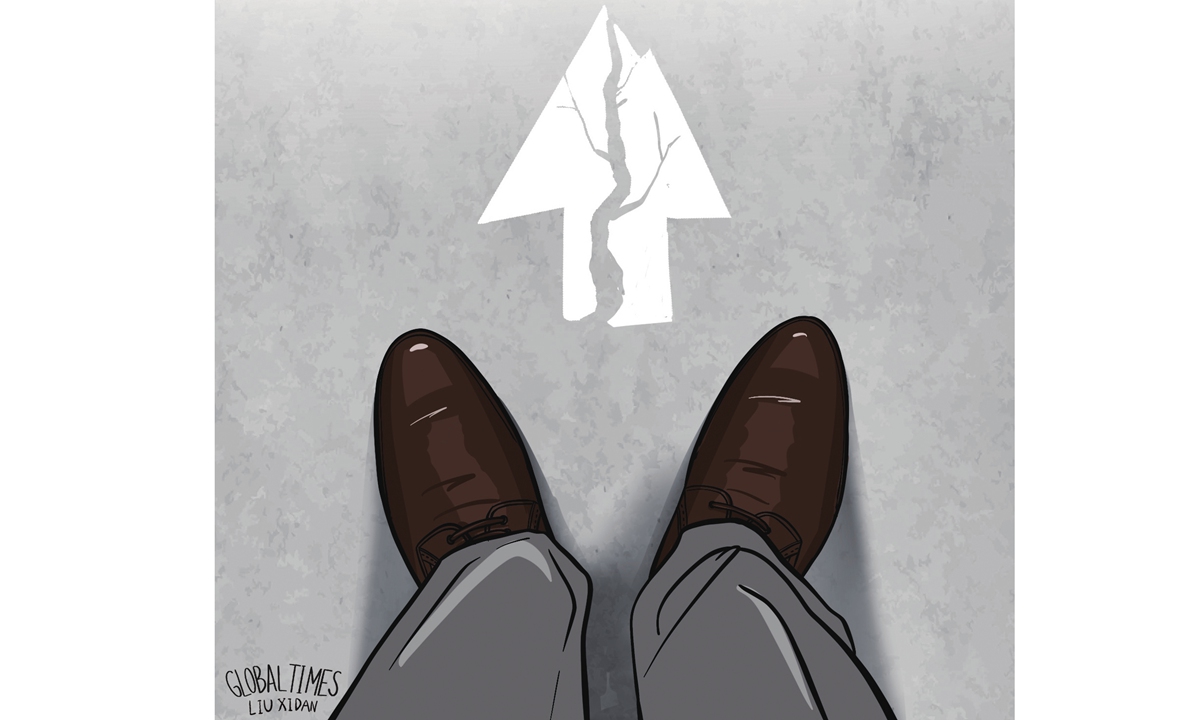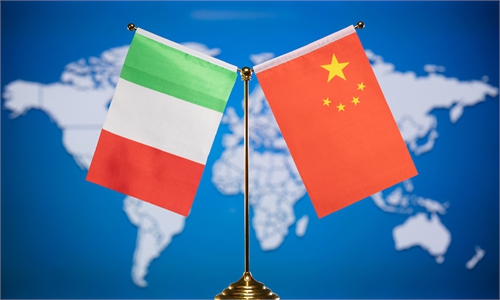
Illustration: Liu Xidan/GT
To consider Italy's decision to extend or terminate the Memorandum of Understanding (MOU) with China, let us begin by discussing a precedent of sorts.Western countries have resolutely tried to isolate Russia. No honest observer could describe these attempts as a shining success. In some cases, imports even increased: Spain, for instance, bought 84 percent more Russian LNG since the outbreak of the Russia-Ukraine conflict.
Other advancements were superficial: Italy's politicians presented their turn toward Algeria as a great step toward "energy independence" in July last year. They did not remind their public Algeria has very solid ties with Russia, including a recent multi-billion arm deal. If instead of buying oil from Russia, we buy from Algeria, which then increases its import from Russia, what is going to change ultimately?
Triangulations between Russia and the West are widespread. Turkey is a NATO country: yet its export to Russia is growing (by 23.9 percent year-on-year, June figure: an 88.6 percent increase from the start of 2023). India bought "large volumes of Russian crude" to resell it to the EU.
Unsurprisingly, a year and a half after the conflict started, and too many packages of sanctions to count, the IMF projects that Russia's economy will outperform Germany and the UK.
Now, playing games with China would require ruses of an entirely different league. China is the top trading partner to more than 120 countries.
A proverb from the times of the Roman Empire says: "All roads lead to Rome." Whatever decisions and directions you take, you will eventually return to what is major and central. Escape, work around, "de-risk" as much as you want: China's size, its trading figures and its other partners will not be determined by Western policies and actions. 70 percent of 2023 global GDP growth will come from Asia. Even if the West redirected its business relations elsewhere, these regions' solid and growing ties will ultimately benefit China's economy. Strategic technologies, materials, and components that "de-risking" aims at keeping from China, will ultimately find their way there: unless the West strangled itself in "splendid isolation."
In practice, "de-risking" amounts to an inconsistent trade policy. In April, Macron visited China with 50 business leaders and signed important deals. Meloni herself seeks guarantees that Italy will somehow maintain economic relations with China. This à la carte way of cherry-picking packages of cooperation prevents the development of a flourishing partnership together with any meaningful "containment" of Chinese growth. One cannot have their cake and eat it.
The Italian government noticed the US is a larger trading partner than China. But this weights against terminating the MOU: diversification is the most elementary form of "de-risking". What would happen if a recession hit the US by the end of 2023 - as forecasted by the HSBC - or another "America-first" president renegotiates deals?
Some rejected the Global Times' assumption of US influence on the matter. In fact, already in May, the Italian press was reporting on "US pressing" to terminate the MOU.
Meloni should stay sober about what she gets back. While Biden received her, the New York Times penned a harsh editorial with her disfigured portrait. Herself, her government, her coalition are deeply disliked by the current US administration. If Meloni manages to visit China, she will experience a power that does not project ideological and domestic policy preferences on partners. It would be a pity if Italy's China policy were decided before having heard from the Chinese side.
Domestically, Meloni dives into perilous waters when she sacrifices national interests to supine hyper-Atlanticism. Former Rome mayor Gianni Alemanno protested by threatening the launch of a new party. Italy's GDP just shrank by 0.3 percent in the second quarter of this year, and welfare subsidies are being cut. The government's approval rate is falling. Failing to steer the country away from the path of decline would inflict suffering on the Italian people and spell doom on Meloni's political future.
Historically, the position that yielded the highest benefits was a balanced, "heterodox", "Italian style" of diplomacy: "On the one hand, Italy was one of the most loyal members of the Western coalition. On the other hand… strikingly, Italy maintained close commercial and diplomatic contacts with pro-Soviet countries in Europe and the Middle East." (Filippo Andreatta).
It would thus be tragically ironic if the "sovereignist" Giorgia Meloni terminated it.
The author is a foreign policy analyst for Italy and the EU. opinion@globaltimes.com.cn



